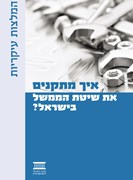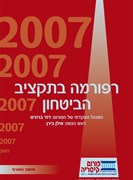

Publications Regarding reform
Articles

Israel Needs a DOGE, But Not Like America’s
Written By: Tomer Lotan
Many in Israel have watched Elon Musk's DOGE department and advocated for implementing the same approach in Israel. However, the model should be attuned to Israeli needs, including reducing the inflated number of government ministries and curbing wasteful budget allocations, such as the coalitionary funds.

The Two Coalitions Israel Needs Now
Written By: Yohanan Plesner
It is increasingly clear that Israel’s future depends on the forging of two coalitions. One is a multinational alliance determined to turn the Palestinian issue from a driver of conflict into an engine of peace. The other, is an internal Israeli coalition ready to pursue a series of bold social, economic, and political reforms.
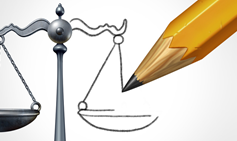
Completing Israel’s Constitutional Process
IDI is currently in the process of composing a revised proposal for a full constitutional arrangement for the State of Israel as it marks 75 years of independence.

A Knesset in the Deep Freeze
Written By: Dr. Chen Friedberg
Those who are not familiar with the Knesset’s day-to-day activities may mistakenly believe that it normally functions efficiently.

The Road to Better Governance
Written By: Yohanan Plesner
The start-up nation owes it success to the democratic system of government established by its founders. Israel’s liberal democracy not only unleashes the creative talents of individual Israelis, it fosters a business environment favorable for the establishment of companies with disruptive potential on a global scale. However, Israel’s continued success should not be taken for granted. Indeed, there are a number of signs that Israeli governance may be weakening.
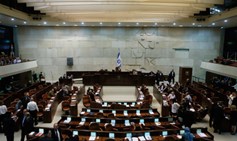
How to Prevent the Recurrence of Early Knesset Elections
Written By: Yohanan Plesner
IDI President Yohanan Plesner recommends a change of approach and some practical steps for changing the reality in which the Israeli public repeatedly goes to the polls to elect a new Knesset before the previous Knesset has finished its term.

Legal Opinion on the Israel Hayom Law
Written By: Prof. Mordechai Kremnitzer, Dr. Tehilla Shwartz Altshuler
A summary of a legal opinion opposing the "Law for the Advancement and Protection of Print Journalism in Israel," which would prohibit the distribution of a full-sized daily newspaper in Israel free of charge.

IDI's Prof. Gideon Rahat Responds to the Proposed "Largest Party" Bill
Head of IDI's Political Reform project responds to reports that Prime Minister Netanyahu is planning to promote legislation that would automatically give the head of the largest Knesset party the right to form the government.

IDI: Advocates of Diversity and Transparency in the Media
Written By: Dr. Tehilla Shwartz Altshuler
In a fiery op-ed, Dr. Tehilla Shwartz Altshuler responds to charges of bias and lays out IDI's pro-active agenda in favor of media diversity and transparency and its efforts to save the <em>Makor Rishon</em> newspaper.

Separating the Prosecution from the Police
Written By: Prof. Mordechai Kremnitzer, Dr. Guy Lurie
Most criminal cases in Israel are prosecuted by the Israel Police rather than by the State Prosecutor. Prof. Mordechai Kremnitzer and Dr. Guy Lurie call for a division that would make the Police responsible for investigations and the State Prosecutor responsible for indictments and trials.

On the Decline in Voter Participation in Municipal Elections in Israel
Written By: Dr. Assaf Shapira
Why is voter participation in local elections in Israel so low? Assaf Shapira explains the reasons behind this phenomenon, discusses its implications, and offers possible remedies.

A Professional Assessment of the Governance Bills
Written By: Prof. Gideon Rahat
A professional assessment of proposed changes to Basic Law: The Government and the Election Bill, which was submitted by Prof. Gideon Rahat to MK David Rotem, Chairman of the Knesset Constitution, Law and Justice Committee.

In Israel, Rescuing Government from Itself
Written By: Gary Rosenblatt
Dr. Arye Carmon, co-founder and president of the Israel Democracy Institute (IDI), discusses how the lack of a constitution is an internal existential threat to Israel. Dr. Carmon's approach is inclusive and integrative, including such remedies as one-ballot elections and a Constitution by Consensus.

Elections for the Local Authority – Who, What, When, Where and How?
Written By: Dana Blander
An exploration of voter participation in municipal elections in Israel that explores the possible reasons for low voter turnout and proposes ways to increase citizen participation in local politics.

Proper Representation - Let's Play!
As the Knesset celebrates its 69th birthday on Tuesday, Jan. 30, here is a chance to see how you score on knowledge of Israel's parliament. What did Israel's lawmakers do before joining the Knesset? What did they do after leaving? what are the benchmark requirement to becoming an MK? How many are currently serving their first term? Let's play!

Behind the Scenes of Israel's Ministerial Committee For Legislation
Written By: Dr. Dana Blander, Dr. Chen Friedberg
There are ways to transform this powerful committee into one that combines politics with professionalism, instead of being one more arena for the settling of political scores.
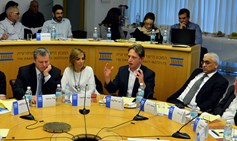
Civil Service Commissioner: For Country or Government?
Written By: Motty Shapira
The civil service commissioner holds an important public position, and should not be relegated to serving as a rubber stamp for the government.



